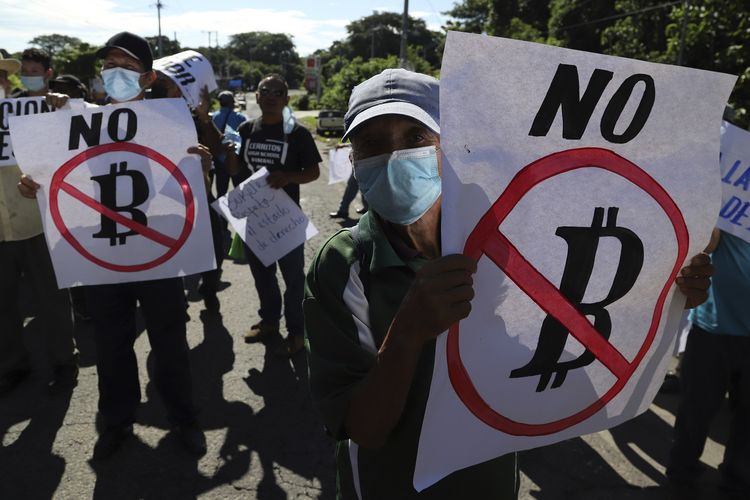The Indonesian Ulema Council ( MUI ) officially forbids the use of cryptocurrencies or cryptocurrencies as currency. More precisely, MUI forbids cryptocurrencies as a medium of exchange/buying and selling transactions.
Apparently, Indonesia is not the only one that limits the use of cryptocurrencies. Several other countries also enforce similar rules, even completely banning activities related to cryptocurrencies .
1. China
The Chinese government began to restrict the use of cryptocurrencies since 2013 through various restrictive measures. At that time, the restrictions were only carried out partially and gradually, not comprehensively. Until finally, in September 2021, China officially banned the use of crypto entirely. In fact, China is one of the countries with the world's largest cryptocurrency market . Cryptocurrency mining and trading activities are designated as illegal activities and are not permitted by the government. As a result, some currency exchange services do not provide access to their services to the Chinese public. They also block IP addresses of Chinese citizens. Summarized from the BBC, representatives of the People's Bank of China said that cryptocurrencies could threaten the security of their citizens' assets. In addition, efforts to eradicate cryptocurrency activities are said to be aimed at the success of China's vision of reducing carbon emissions by 2030 and becoming a carbon neutral country by 2060.
2. Algeria
Algeria completely banned cryptocurrencies in 2018. The government of Algeria stipulates that all activities related to "virtual currency" are prohibited by the state. According to the Algerian government, a currency is called virtual when it cannot be backed up or replaced with physical currency or documents, such as checks, coins or payment cards. Anyone who violates these rules will be prosecuted under financial law.
3. Nepali
Nepal started legalizing cryptocurrency mining and trading activities in 2019 under the Foreign Exchange Act. The reason is that cryptocurrencies carry a high risk and no one is held responsible if their prices fall.

4.Vietnam
Unlike some previous countries, cryptocurrencies are only restricted in Vietnam. In Vietnam, cryptocurrency mining activities and the use of blockchain technology are still legal. But trading or buying and selling activities using cryptocurrencies is not allowed. It is not known why the Vietnamese government imposed the restrictions. Some speculate that Vietnam is following the Chinese government's policy to avoid a currency that cannot be regulated and controlled by the government.
5. Russia
The Russian government doesn't actually completely ban cryptocurrencies. However, there are several regulations that have been rolled out regarding cryptocurrencies . In July 2020, for example, Russia passed the rules for taxing cryptocurrencies. However, the use of cryptocurrencies as a payment method is prohibited there. One of the reasons put forward is that the use of cryptocurrencies as a transaction tool is considered to be able to disrupt the circulation of money there. Meanwhile, residents of Russia are allowed to have cryptocurrency digital wallets outside their country. However, there is a chance that the use of cryptocurrencies as an exchange rate will be legalized in Russia. The reason is, Russian President Vladimir Putin said that cryptocurrencies also have the right to be used as a means of payment. However, not all commodities can be traded with cryptocurrencies. Putin is still hesitant to allow trade in exports such as oil, transacted with cryptocurrencies.
6. Bangladesh
Currently, the Bangladeshi government does not allow trading of cryptocurrencies because it is against financial regulations and laws there, specifically the Foreign Exchange Regulation Act 1947, Money Laundering Prevention Act 2012, and Anti-terrorism Act 2009. Moreover, according to the Bangladeshi government, the use of cryptocurrencies has a high risk because it is not regulated and has a decentralized nature. As such, buying and trading of cryptocurrencies is completely prohibited in Bangladesh.
7. Ecuador
Ecuodor banned the use of cryptocurrencies from July 2014. At the same time, the government of Ecuador creates and uses their own electronic money backed by the central bank in Ecuador. However, the popularity of bitcoin in recent times has made the use of bitcoin in Ecuador increase even though it is illegal. In fact, there is an Ecuadorian Bitcoin community there.
8. Egypt
The case in Egypt is somewhat similar in Indonesia. Cryptocurrencies are not completely banned in Egypt. But the religious law there prohibits its use.

View Photos El Salvadoran farmers demonstrate against the use of bitcoin as legal tender, on the Pan-American Highway in San Vicente, El Salvador, Tuesday (7/9/2021). El Salvador became the first country in the world to legalize bitcoin as a transaction tool. (AP PHOTO/SALVADOR MELENDEZ)
Muslim legislators in Egypt say the existence of cryptocurrencies can threaten national security. Apparently, there is a part of the Egyptian government that supports cryptocurrencies . But according to Muslim legislators, governments that support cryptocurrencies can actually harm the country's economy. While there are cryptocurrency limits, that doesn't stop Egyptians from buying and using cryptocurrencies.
9. Turkey
In April, the Turkish government banned the use of cryptocurrencies as a means of payment because it was considered high risk. President of Turkey, Recep Tayyip Erdogan said that he wanted to control cryptocurrency activities in his country by imposing special regulations. The regulation is currently in draft and it is not known when the bill will be implemented, and how it will affect Turkish citizens who own cryptocurrency assets.
10. North Macedonia
North Macedonia has completely banned cryptocurrencies in its country. North Macedonians are prohibited from spending, trading or investing in cryptocurrencies . The government argues, cryptocurrency is related to criminal activity. In addition, the unregulated nature of cryptocurrencies makes it high risk.
How about in Indonesia?
In Indonesia, cryptocurrencies are classified as restricted. MUI forbids cryptocurrencies because they contain gharar and dharar , as well as contrary to Law (UU) Number 7 of 2011 and Bank Indonesia Regulation Number 17 of 2015.
Law Number 7 of 2011 itself regulates currency. In the regulation, it is explained that the legal instrument of payment in Indonesia is rupiah. So, crypto assets are not a means of payment.
Meanwhile, Bank Indonesia (BI) Regulation Number 17 of 2015 regulates the mandatory use of the rupiah in the territory of the Unitary State of the Republic of Indonesia (NKRI).
The BI regulation explains that rupiah is the currency of the Unitary State of the Republic of Indonesia which is valid as a legal tender in the territory of the Unitary State of the Republic of Indonesia.
Meanwhile, the MUI stated that cryptocurrencies are still allowed as long as they are assets or investments, not as a means of payment.
According to the MUI, the use of cryptocurrency as a commodity or asset still qualifies as sil'ah , or something that is used to fulfill human needs and has benefits, so it is legal to own and trade.
Thus, according to the MUI, Muslims in Indonesia are still allowed (halal) to store crypto as an asset or investment, and trade it, but it is forbidden to use crypto as a means of payment or buying and selling transactions.



You must be logged in to post a comment.